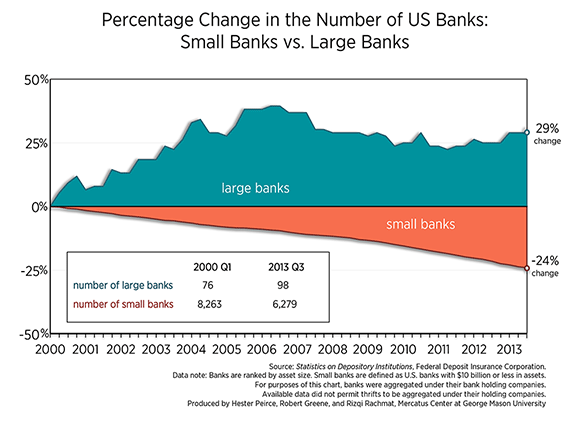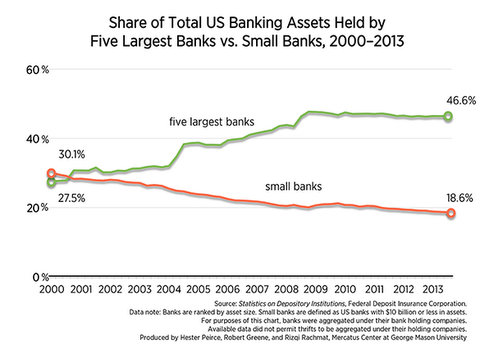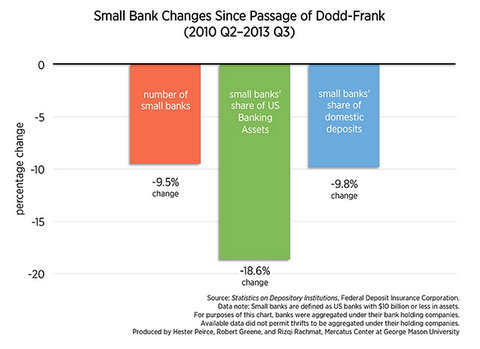The Dodd-Frank Act of 2010 was hailed by its advocates as the regulatory answer to the excesses of the Big Banks that led to the financial crisis.
But just about the only thing Dodd-Frank has accomplished is the slow destruction of small community banks.
 The idea behind Dodd-Frank was to add mountains of new regulations to the banking industry to prevent misbehavior.
The idea behind Dodd-Frank was to add mountains of new regulations to the banking industry to prevent misbehavior.
But instead of putting a leash on the Too Big to Fail Banks, Dodd-Frank has actually helped them get even bigger and more powerful at the expense of small banks.
"It was a monumental victory for the Too Big to Fail banks," said Money Morning Capital Wave Strategist and Wall Street Insights and Indictments editor Shah Gilani. "What people don't understand is that destroying the smaller banks for the benefit of the Big Banks was the game."
 The Mercatus Center at George Mason University last month created a series of charts illustrating just how bad this trend has gotten.
The Mercatus Center at George Mason University last month created a series of charts illustrating just how bad this trend has gotten.
The first chart shows how the number of large banks has increased by 29% since 2000, while small banks (defined as those with $10 billion in assets or less) declined by 24%.
The second chart shows an even more troubling trend. The share of total U.S. banking assets of the nation's five largest banks - led by JPMorgan Chase & Co. (NYSE: JPM) and Bank of America Corp. (NYSE: BAC) - have soared from 30.1% in 2000 to 46.6%, while the share of small banks has shrunk to just 18.6% from 30.1%.
 A lot of the damage has occurred since the passage of Dodd-Frank, as seen in the third chart. The Mercatus study said that between July 2010 and the third quarter of 2013, the United States lost 650, or 9.5%, of its small banks. And the small banks' share of banking assets fell 18.6%, while their share of domestic deposits has slipped 9.8%.
A lot of the damage has occurred since the passage of Dodd-Frank, as seen in the third chart. The Mercatus study said that between July 2010 and the third quarter of 2013, the United States lost 650, or 9.5%, of its small banks. And the small banks' share of banking assets fell 18.6%, while their share of domestic deposits has slipped 9.8%.
Although the Mercatus study points out that some of the decline of small banks is organic, resulting from mergers and consolidation, a large part of it has been driven by "increasing regulatory burdens," which have accelerated since the passage of the Dodd-Frank Act.
"Regulatory compliance can be a particular challenge for small banks with limited compliance expertise," write the report's authors, Hester Pierce and Robert Greene. "Regulatory expenses absorb a larger percentage of small banks' budgets than of their larger counterparts' budgets."
So small banks have had no choice but to either merge with a larger bank (or each other), or in at least one case, Shelter Financial Bank in Missouri, simply shut their doors.
And the worst is yet to come...
Why Dodd-Frank's Harm to Small Banks Will Get Worse
Despite the good intentions behind it, the Dodd-Frank Act has proven to be a regulatory nightmare. It authorizes nearly 400 new bank rules, which when finished will add some 5,000 pages to the National Register.
But it's not just the number of rules weighing on banks.
The process of proposing, writing, and finalizing the Dodd-Frank regulations is taking an agonizingly long time, leaving banks uncertain about how rules still in the pipeline will affect them.
Incredibly, nearly four years after the law was passed, almost half of the Dodd-Frank regulations still aren't finalized, and 110 of them are yet to be proposed, according to law firm Davis Polk.
But as more rules go into effect each year, life gets harder for the small banks.
In a survey by the Kansas City Federal Reserve last year, 91% of small banks said they expect higher training and software costs because of Dodd-Frank. And the Minneapolis Fed estimates that the hiring of just two workers to comply with new Dodd-Frank regulations would send one-third of small banks into the red.
We're already seeing the impact.
Last year the number of federally insured institutions fell below 7,000 for the first time since 1934, and analysts predict the number will fall below 5,000 over the next decade.
This is a problem because small banks provide services at the local level that larger banks do not, primarily small-business loans, mortgages, and farm loans, in addition to customer deposits. They also tend to be far more integrated into the communities they serve.
The loss of small banks will make it harder for local businesses to function, which will throw sand in the gears of local economies, and, over time, the U.S. economy.
"If community banks continue to go out of business or are forced to consolidate, we can expect to see an even greater concentration of assets among the 'Too-Big-To-Fail' institutions - and a greater number of Americans without a local bank," Sen. Jerry Moran, R-KS, a member of the Senate Banking Committee, wrote on his website last year. "These unintended Dodd-Frank consequences will not protect consumers, stabilize the financial system, or promote recovery of the American economy."
Have you lost small banks in your community? And should Congress try to fix Dodd-Frank - or repeal it and start over? Let us know on Twitter @moneymorning or Facebook.
Looking at the huge fines the Big Banks have been forced to pay over the past year or so, it would be easy to think that regulators have succeeded in curbing the rogue behavior on Wall Street. But they've done no such thing - the Big Banks are still screwing you...
Related Articles:
- Mercatus Center:
The Decline of US Small Banks (2000-2013) - Investor's Business Daily:
Dodd-Frank Red Tape Strangling Small Banks to Death - Moran's Memo:
Three Years Later, Community Banks Bear Burden of Dodd-Frank
About the Author
David Zeiler, Associate Editor for Money Morning at Money Map Press, has been a journalist for more than 35 years, including 18 spent at The Baltimore Sun. He has worked as a writer, editor, and page designer at different times in his career. He's interviewed a number of well-known personalities - ranging from punk rock icon Joey Ramone to Apple Inc. co-founder Steve Wozniak.
Over the course of his journalistic career, Dave has covered many diverse subjects. Since arriving at Money Morning in 2011, he has focused primarily on technology. He's an expert on both Apple and cryptocurrencies. He started writing about Apple for The Sun in the mid-1990s, and had an Apple blog on The Sun's web site from 2007-2009. Dave's been writing about Bitcoin since 2011 - long before most people had even heard of it. He even mined it for a short time.
Dave has a BA in English and Mass Communications from Loyola University Maryland.



